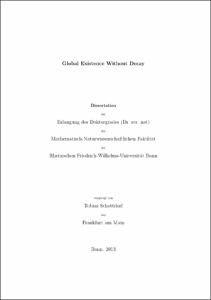Global Existence Without Decay

Global Existence Without Decay

| dc.contributor.advisor | Koch, Herbert | |
| dc.contributor.author | Schottdorf, Tobias | |
| dc.date.accessioned | 2020-04-19T02:12:22Z | |
| dc.date.available | 2020-04-19T02:12:22Z | |
| dc.date.issued | 05.12.2013 | |
| dc.identifier.uri | https://hdl.handle.net/20.500.11811/5801 | |
| dc.description.abstract | We treat some problems related to the small data global existence theory of some dispersive PDEs. That is, we try to abstractly construct solutions which exist globally in time and have “good” properties, under a smallness condition on the initial data, typically given at time t = 0. What is special here is that we do not impose strong decay on this data, that is, we only assume that they are L2 based Sobolev functions. More precisely, we treat 1. the Klein-Gordon equation with a quadratic nonlinearity Q, positive mass and initial data from appropriate standard Sobolev spaces. We can also treat systems under a condition on the masses involved in the nonlinear interactions. 2. a special quadratic nonlinear Schrödinger equation with initial data in the scaling critical Sobolev space and 3. the modified Novikov-Veselov equation in two space dimensions, which has a cubic nonlinearity containing roughly one derivative. 3. the modified Novikov-Veselov equation in two space dimensions, which has a cubic nonlinearity containing roughly one derivative. For each of the above equations and initial data from a sufficiently small ball around the origin, we construct global solutions which scatter and depend smoothly on the initial data, using a fixed point argument. In the second part of this work, we turn towards negative results and start with the observation that a solution operator constructed by the techniques used in the proofs of the statements above imply that there is a smooth scattering operator, which in turn shows that a trilinear spacetime interaction of free waves can be bounded by their inital data. Such an estimate is very close to so-called convolution estimates in Fourier spacetime, for which the behavior is known, and we can use this to derive contradictions in some cases. This is related to the concept of time resonance, and we can show that the results above for the Klein-Gordon and Schrödinger equations are sharp in some sense. Regarding the modified Novikov-Veselov equation, we show a negative result for the related Novikov-Veselov equation, for which the nonlinearity is replaced by a quadratic nonlinearity containing roughly one derivative. | en |
| dc.language.iso | eng | |
| dc.rights | In Copyright | |
| dc.rights.uri | http://rightsstatements.org/vocab/InC/1.0/ | |
| dc.subject | partielle Differentialgleichungen | |
| dc.subject | Schrödinger-Gleichung | |
| dc.subject | Klein-Gordon-Gleichung | |
| dc.subject | nichtlineare dispersive Gleichung | |
| dc.subject.ddc | 510 Mathematik | |
| dc.title | Global Existence Without Decay | |
| dc.type | Dissertation oder Habilitation | |
| dc.publisher.name | Universitäts- und Landesbibliothek Bonn | |
| dc.publisher.location | Bonn | |
| dc.rights.accessRights | openAccess | |
| dc.identifier.urn | https://nbn-resolving.org/urn:nbn:de:hbz:5n-34306 | |
| ulbbn.pubtype | Erstveröffentlichung | |
| ulbbnediss.affiliation.name | Rheinische Friedrich-Wilhelms-Universität Bonn | |
| ulbbnediss.affiliation.location | Bonn | |
| ulbbnediss.thesis.level | Dissertation | |
| ulbbnediss.dissID | 3430 | |
| ulbbnediss.date.accepted | 10.09.2013 | |
| ulbbnediss.fakultaet | Mathematisch-Naturwissenschaftliche Fakultät | |
| dc.contributor.coReferee | Tzvetkov, Nikolay |
Dateien zu dieser Ressource
Das Dokument erscheint in:
-
E-Dissertationen (4383)




